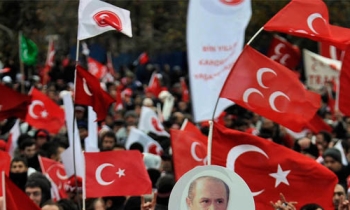KABUL (AFP) - Television stations are trying to introduce some kind of modernity into conservative and mostly illiterate Afghanistan but their efforts are being threatened by planned changes to media laws.
Parliament, dominated by former mujahedin -- commanders of the jihad or holy war to resist the Soviet invasion -- is due in the coming weeks to amend the media law decreed two years ago by President Hamid Karzai.
The aim is to bring it line with the post-Taliban constitution which says "no law shall contravene the tenets and provisions of the holy religion of Islam."
The plans open the way for "all interpretations by censors," says Saad Mohseni, director of the media group Moby that includes a radio station and one of the most popular television channels, Tolo.
"The freedom of the press is the biggest success in this country, where there is neither security nor prosperity," he says.
"We (the media) are talking about human rights, of corruption, we are asking why these people are in control of government and offer an alternative, and we provide entertainment," he says.
"But with this new law, the authorities want to take control of the media."
Tolo, launched in 2004 and broadcast in Afghanistan's biggest cities, is perhaps the most audacious of a host of new broadcasters that sprang up after the ultraconservative Taliban were toppled from power in 2001.
It is critical of the authorities and has not held back on reporting on the insurgency, despite government efforts to curb this saying it gives too much publicity to Taliban propaganda or that it could add to a sense of insecurity.
It has also not been shy about showing parliamentarians sleeping on the benches of the assembly and is home to the enormously successful "Afghan Star", a version of "American Idol".
Two other stations, private Ariana and public Radio Television Afghanistan (RTA), also try to project a modern image in-between their religious programming, although they do obscure the cleavage of Indian stars and the legs of women in short skirts.
Those leading changes to the law are Islamists who have been appointed to the ministry of culture, says a media official who would only speak on condition of anonymity.
"They say there are too many women on television and too many Indian films that do not respect the rule of Islam," he says.
An Ariana manager Abdul Jabar Baryal, says "the spirit of modernity and freedom escapes this government of ex-communists and mujahedin who want the media to become a kind of propaganda machine."
But a deputy minister of culture, Mohammad Mobarez Rashedi, says the changes are necessary so "morality and security can be more taken into account."
"Television stations are sometimes taking it too far," he says. "The media can play a major role in security but they only report negative things. They nearly never talk about what the government does, the process of reconstruction."
A former mujahedin who is at the head of lower house of parliament's telecommunications committee, Al Haj Khalid Farooqui, says what he sees on television sometimes is "disgusting."
"The women are not wearing veils and behave in a fashion which is against Islam. They could be a bad influence on the Afghans who watch these programmes," says Farooqui.
"If in India they show men and women as almost equal, that cannot be the case in Afghanistan," he says, referring to popular India soap operas shown here.
"These programmes and pictures of women who are half naked are like a poison that could spread in our society and give a pretext to people to side with the enemies of the government who say, 'But look what is happening here.'"
Media rights groups have expressed concern, while the UN representative in Afghanistan, Tom Koenigs, said the changes were expected to "harm media development."
"It is often said that the first victim of war is the truth. We must prevent that from becoming the case in Afghanistan," he said.









